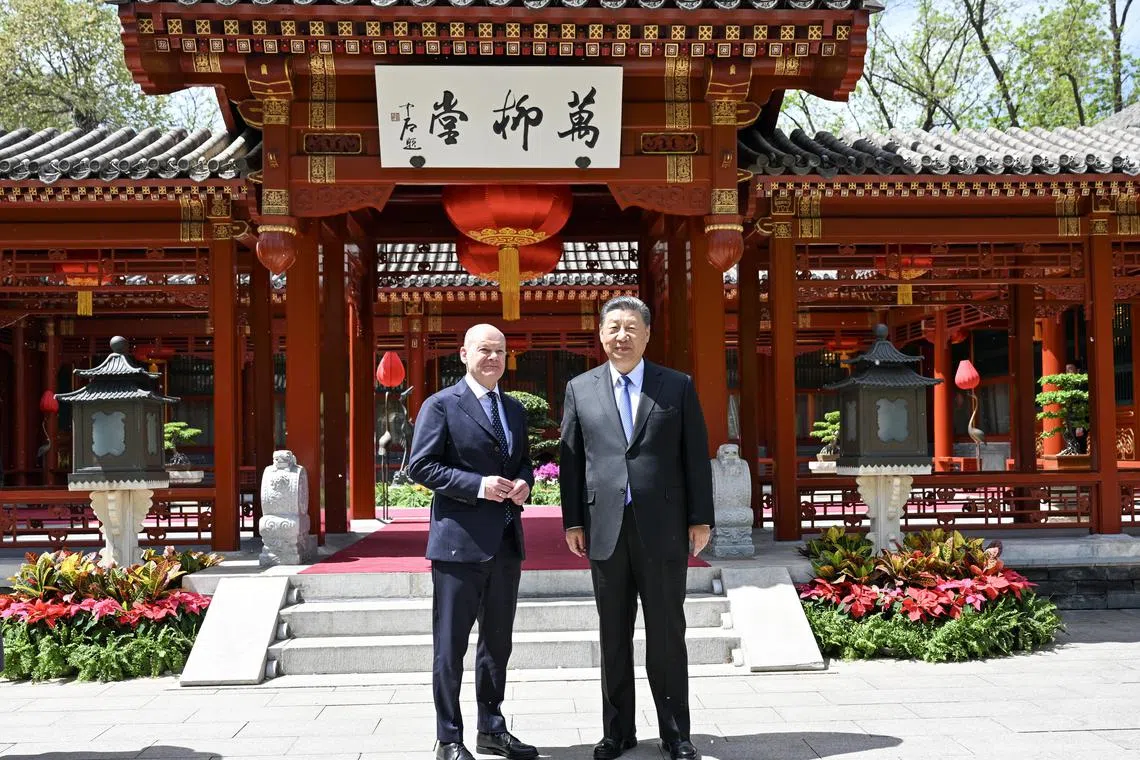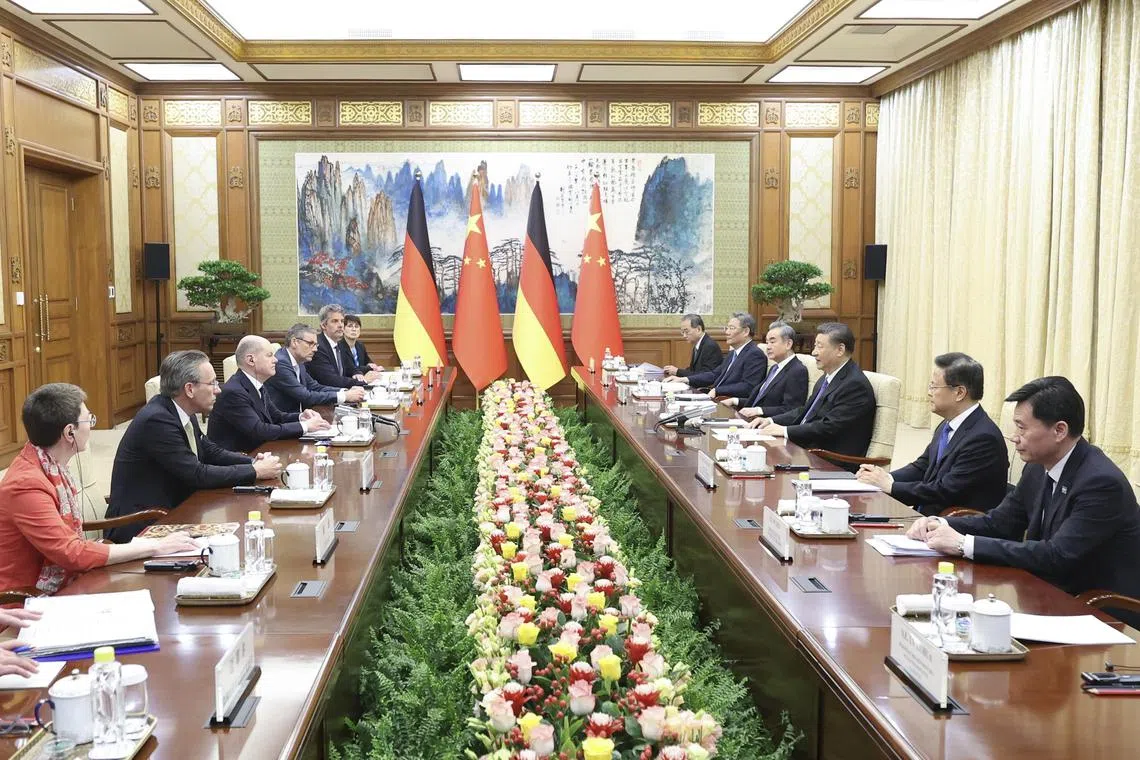Germany’s Scholz lobbies China’s Xi to improve market access, pressure Russia
Sign up now: Get ST's newsletters delivered to your inbox

Mr Scholz's talks with Mr Xi (right) capped a three-day tour of China, during which Mr Scholz walked an economic tightrope.
PHOTO: EPA-EFE
Follow topic:
BEIJING - German Chancellor Olaf Scholz lobbied for better market access for German firms in China in talks with Chinese President Xi Jinping on April 16 and urged him to exert pressure on Russia to withdraw its forces from Ukraine.
The talks with Mr Xi capped a three-day tour of China during which Mr Scholz walked a tightrope, conveying growing concerns in Europe about Beijing’s economic policies and support for Russia while also promoting business ties with Germany’s largest trade partner.
The visit was the first since Berlin agreed a China strategy outlining the need to reduce strategic dependencies on Chinese goods, and since the EU launched several investigations into whether Chinese manufacturers are dumping subsidised goods on its market.
Mr Scholz, who met for more than three hours with Mr Xi, before later seeing Premier Li Qiang, said he had pressed the case for China to guarantee German firms equal market access, the protection of intellectual property and a reliable legal system.
“I expressed my concern... that unilateral economic policy decisions in China are creating major structural difficulties for companies in Germany and Europe,” he said, noting he hoped this would quickly lead to practical solutions.
On the EU anti-subsidy investigations, Mr Scholz said the bloc should not act out of protectionist self-interest but competition should be fair and that it is important to establish processes to ensure this. He said he discussed with Mr Xi the role of the World Trade Organisation.
Mr Xi showed little willingness to make concessions, saying Chinese green tech exports have “not only enriched global supply and alleviated inflationary pressure, but also contributed greatly to the response to climate change”.
“(Germany and China) should be vigilant against rising protectionism,” Mr Xi said.
No alternative to Chinese market
Mr Scholz was joined on his trip by senior German executives, such as Mr Ola Kallenius, chairman of Mercedes-Benz, and Mr Oliver Zipse, chief executive of BMW, underlining the importance of the Chinese market to Europe’s largest economy.
Sino-German commercial ties should not only be cultivated but expanded, Mr Kallenius told German broadcaster ARD in Beijing on April 16.
“Withdrawing from such a large market is not an alternative, but rather strengthening our position,” he said about the company’s strategy in China, the world’s second-largest economy.
BMW’s Mr Zipse expressed a similar view. “We actually see more opportunities than risks,” he told the ARD news programme Tagesschau.
Mr Xi told Mr Scholz that China and Germany have “huge potential” for cooperation in both traditional fields such as machinery manufacturing and automobiles and emerging fields including green transformation and digital artificial intelligence.
China has also lifted restrictions on imports of beef and apples from Germany, Mr Scholz said.

Chinese President Xi Jinping meeting German Chancellor Olaf Scholz at the Diaoyutai State Guesthouse in Beijing, China, on April 16, 2024.
PHOTO: EPA-EFE
Critics worried that the trip - Mr Scholz’s longest bilateral visit anywhere since taking office in 2021 - is a sign Germany is not serious about diversifying trade and will continue to prioritise short-term financial gain over long-term security.
Pressure on Russia?
Regarding Russia’s two-year-old full-scale invasion of Ukraine, Mr Scholz said he asked Mr Xi “to exert pressure on Russia so that (President Vladimir) Putin finally calls off his insane campaign, withdraws his troops and ends this terrible war”.
Both leaders agreed they rejected attacks on nuclear facilities such as nuclear power plants, Mr Scholz said, alluding to strikes on the Zaporizhzhia complex in Russian-held southern Ukraine that the two sides have blamed on each other.
But Mr Xi appeared to dismiss a peace summit in Switzerland requested by Ukrainian President Volodymyr Zelensky and scheduled for June that Russia has made clear it will not attend.
China supports all efforts towards peaceful resolution, Mr Xi said, such as an international peace conference recognised by both Russia and Ukraine with equal participation by all parties.
Before the trip, German officials had said Beijing’s support and exports to Russia were enabling Moscow to wage a war of aggression in Ukraine and causing a “growing loss of reputation for China” in Europe and beyond.
Mr Scholz further said he had discussed at length with Mr Xi the supply of dual-use goods to Russia.
“There can be no misunderstanding as to how we see things,” he said, without clarifying whether he had extracted any kind of commitment from China to limit such exports. REUTERS

